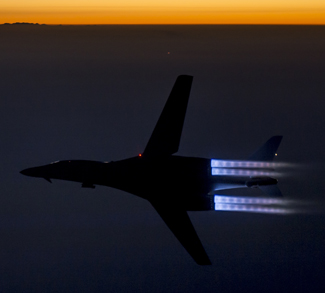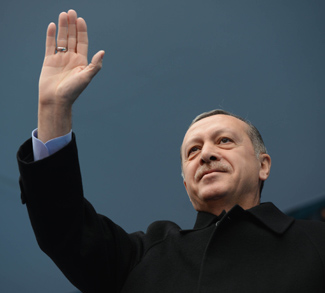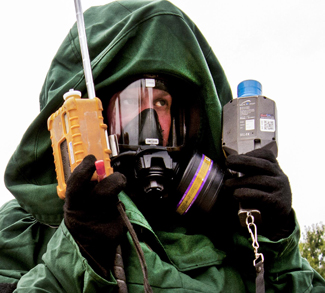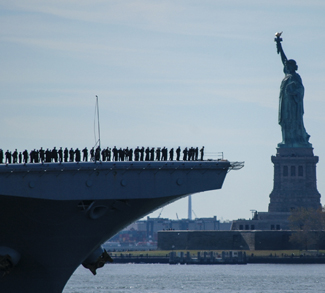The West has a self-deceiving notion that it will deftly overcome the self-styled Islamic State by relentlessly bombing Syria and Iraq. What it doesn’t realize is that it is this display of military might that is helping the brutal terrorist outfit flourish.
The United States has always created Frankenstein’s monsters wittingly or unwittingly for itself. Be it Al Qaeda, the Taliban, or Islamic State, all are the creations of the United States. US President Barack Obama himself has conceded that the invasion of Iraq created ISIS. And now the country is paying a heavy price.
Not only this, the West also armed fighters in Libya to fight against Col Muammar Gaddafi, who, after the death of the dictator, got hold of the former army’s weapons and gained strength, destabilising the region. It made Libya a fertile breeding ground for transnational militants. The same thing happened in Syria. The West armed and backed the Islamic State to fight against the Bashar al-Assad regime only to realize later that it is the bigger evil than Assad. Consequently, the US bombed ISIS in Syria, which gave Assad room to fight opposition forces.
The Islamic State strategy is simple: cash in on Muslim grievances. The more brutalities and interventions there are by the West in Muslim countries, the better it is for ISIS. To make matters worse, the US-backed Nouri al-Maliki’s Shia regime deepened the Shia-Sunni schism in Iraq. The subsequent creation of the anti-Shia ISIS was a foregone conclusion. The atrocities by Shia militias – allied with the Maliki government – against Sunnis resulted in the latter’s joining the ISIS ranks to fight against the Shia regime.
It seems the Obama administration has not learned from its predecessor’s follies. It is, in fact, US support of authoritarian governments of Saudi Arabia, the UAE, and Egypt which breeds terrorism. Terrorist outfits like ISIS exploit such scenarios and convince the Muslim populations of such countries to fight against the US in the name of Islam.
The military offensives by the U.S. in Syria and Iraq add fuel to fire. Such an environment gives ISIS an opportunity to grow and receive a regular supply of fighters from all over the world. Washington’s counter-ISIS strategy seems to be nothing but flawed. To add to a series of foreign policy blunders, Washington, in a major policy shift, has decided to send boots on ground in Syria. Dozens of US Special Forces troops, according to the White House, would be there to ‘train, advise, and assist.’
This is despite the fact that US ‘war on terror’ has not achieved peace. Instead, it has increased terrorism which is evident from the Global Terrorism Index prepared by the Institute for Economics and Peace.
According to the index, only 1,500 terrorist incidents occurred in 2000, while the number of such incidents rose to 10,000 by 2013. It means terrorism has increased fivefold since 2000. However, the U.S. is exacerbating the situation by launching military offensives in Iraq and Syria, which are not only open-ended, but also ill-defined.
False Beliefs
Having struck the nuclear deal with Iran, the United States might have scored a diplomatic victory. But the downside of this is that it will be seen as yet another step to isolate the Sunnis in the Middle East. The U.S. might annihilate ISIS with Iran as its ally, but it will surely destabilize Iraq, creating a wider Shia-Sunni divide.
The US military campaign against ISIS is beyond comprehension considering the views of former counter-terrorism adviser at the State Department Daniel Benjamin. The ex-adviser believes IS’s threat to the US is nothing but a farce.
While US Homeland Security Secretary Jeh Johnson says there is no threat to the U.S. from Islamic State, Deputy Director of the US National Counter-terrorism Centre, Nicholas Rasmussen, told Congress ISIS poses a threat to US interests, but only in Iraq. In fact, it is right-wing extremists who have killed more people in the U.S. than Al Qaeda-inspired Muslims since 9/11.
US intelligence officials believe that ISIS has neither the will nor does it have the capability to launch an attack against the U.S. Unlike Al Qaeda, the vicious group does not have plans to strike the ‘far enemy.’ It, however, will most likely perpetrate terrorist acts in the U.S. only once it is convinced that it is the U.S. which has snatched its statehood. Home-grown terrorists may seek inspiration from Islamic State. But then lone wolves can be just as lethal even if ISIS is defeated. It is the US foreign policies and marginalization of Muslims in the West that transform them into terrorists, and that needs to be the focus.
There is also a big question mark over the legality of US military actions in the Middle East. International law permits a country to launch attacks only if it is approved by the UN Security Council, for self-defense, or if assistance is requested by the other country’s government.
US military intervention in Iraq may be legitimate as Baghdad had requested it, but in Syria, this is not the case. Neither the Assad regime requested for the US military strikes nor were such actions authorized by the UN. That the U.S. is trying to ‘degrade and defeat’ ISIS in Syria as a pre-emptive measure in self-defense is an unconvincing argument. The extremist outfit hardly poses any direct security threat to the U.S.
Russia’s Entry
Russia’s entry into the Syrian theater has increased complexities. Despite Russia’s claim that it had been bombing ISIS, it is believed that Moscow has been mostly targeting anti-Assad forces. This has obviously been done because Vladimir Putin doesn’t want to lose a major ally in the Middle East. But this is giving ISIS space and relief in Syria despite Russia’s fear of the group.
Unlike the U.S., which is bombing Syria without legal cover, Russia’s military campaign in Syria is not illegitimate because Damascus has requested it, or, at least it doesn’t have objections over it. This, however, doesn’t suggest that Russia’s entry into the Syrian war will not have negative repercussions.
Even if it is really ISIS that Russia is after, are there are any guarantees that it would be able to defeat an ideology militarily and would not get stuck into a morass? Then there is also the spectre of home-grown terrorism. Russia’s Sunni Muslim community, which has not reacted yet on Russia’s intervention in Syria, might turn violent if it is convinced that Moscow is involved in an anti-Sunni campaign.
Revisiting Foreign Policy
Washington must wrap up its flopped ‘war on terror,’ which has produced more terrorism than peace, and fostered anti-American sentiment. The wars in Afghanistan and Iraq have already cost the US a whopping $4-6 trillion. It must pull out its military forces from the Middle East, stop using proxies and supporting totalitarian Arab regimes.
While forging ties with progressive players in Iraq and Syria might be beneficial to the U.S. and the Middle East, Washington also has the moral obligation to pay reparations for invading and occupying Iraq on flimsy grounds which later proved wrong.
Military action alone cannot eliminate Islamic State. Instead, it will give a huge boost to the ISIS campaign. The US must find a diplomatic solution and a negotiated settlement to the Syrian crisis. If force has to be used against ISIS, it should be from the regional powers, not Iran-backed Shia militias as done by Maliki. The U.S., instead of further aggravating the situation by sending ground troops to Syria and trying to impose its puppet, should let the Syrians decide who will rule the country.
Disenfranchised Iraqi Sunnis must be convinced they have a better future under the present Haider al-Abadi government, and not ISIS. The onus is on Baghdad to gain Sunnis’ trust which will help the Iraqi government fight ISIS.
On one hand, the United Kingdom’s role in war against ISIS is small as compared with the U.S. But its contribution to the US fight is still larger than any other US ally. The attack on British tourists in Tunisia had some messages and agenda.
ISIS wants the UK to be sucked into the quagmire by provoking the Cameron government to commit ground forces to fight ISIS. Moreover, ISIS might take advantage of xenophobia and Islamophobia that may rise in the UK, which already has radical far-right extremist organizations such as the English Defence League. This may lead to further marginalisation and alienation of the UK’s Muslims who will be lured by ISIS to become fighters. There is a huge possibility of this happening in the UK as about 700 British youth are believed to have joined Islamic State’s fight in the Middle East.
Being the partner in Washington’s folly of the Iraq invasion, the UK should also share the burden of reparations, especially after Tony Blair’s face-saving apology and confession of faulty intelligence before the invasion and that it gave rise to Islamic State. But Blair’s was a half-hearted apology ahead of the John Chilcot report, for he refused to concede that invading Iraq and removing Saddam Hussein was a blunder.
The United States and its Western allies have a vital role to play in the Middle East, especially in Iraq and Syria. It is time they played their role prudently to end the political and sectarian turmoil in the Middle East, which are by-products of Western military and political interventions in the region.
The opinions, beliefs, and viewpoints expressed by the authors are theirs alone and don’t reflect any official position of Geopoliticalmonitor.com.




